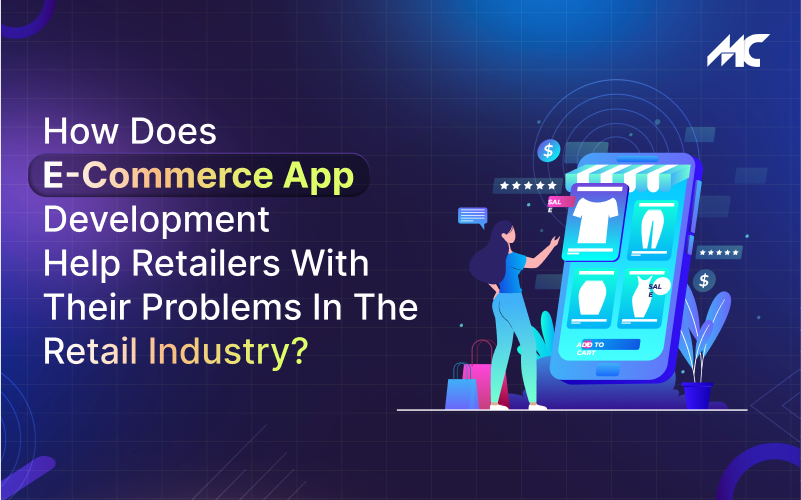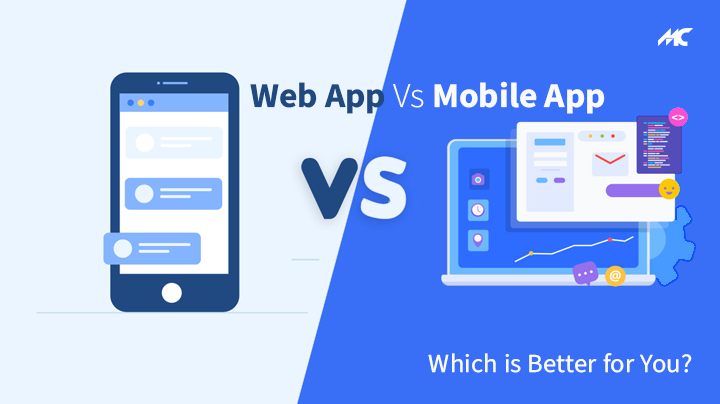Web App Vs Mobile App: Which is Better for You?
There is a misconception among people that web apps and mobile apps are the same. However, this misconception is false. Although mobile and web app development may look similar, they are different in how they are built and deployed. Also, there are many factors to be taken care of, such as budget, audience, purpose, and features.
In this post, we will discuss which one is excellent for your company from Mobile app development & Web app development.
Difference Between Web Apps And Mobile Apps
- Mobile apps can be used on tablets and smartphones. To install a mobile application, just visit a store such as Windows Store(Windows), Google Play (Android), or Apple (iOS). These stores offer functionality that is similar to what you get when you browse a web application from a computer.
- Web applications can run in a browser. They can also be made mobile-friendly to fit on smaller screens. Applications can be made as complex or as simple as needed. You can make them for a single purpose, like mobile apps, or they can be designed to serve multiple purposes.
Although the designs look similar, they use the same fonts and colors scheme. However, they are two completely different products.
- Mobile apps can run offline, but web apps must have a stable internet connection to operate. Though mobile applications are more efficient and faster than web apps, they require to be timely updated. However, web apps can update themselves.
Mobile apps and web apps are built and designed in different ways. It is crucial to learn the way through which each one is built. This will help distinguish the two.
Mobile App Development Process
Mobile apps cost more than web apps. Because they are platform-specific it is almost impossible to launch an app on different platforms. They are however much more efficient and have more functionality and features.
Native mobile apps can be Integrated Development Environments or built using specific languages as per the platform. Apple systems run the iOS native OS. Apple apps can be built using Objective-C, Swift, or the Xcode IDE. Native Android apps are written in Java using the Android Studio and Eclipse IDEs.
Google and Apple offer their customized interface elements, software development tools, and kit. Professionals working in the top mobile app development company can use these tools for creating mobile applications.
Process of Building Web Apps
JavaScript, CSS HTML, HTML and Python are the most common languages used to build web apps. Web apps aren’t easily compatible with mobile applications. Software development tools do not exist to build web apps. Developers have access to templates. Mobile apps are slower and more difficult to develop than web apps. However, they offer multiple features.
Web App Development: The Benefits
Web apps are not designed for every device. However, they have often been created with the “mobile-first” principle. The experience of users is first created for mobile devices, then leveled up big devices such as desktops and tablets. These are some web apps benefits.
- Low-cost development: Web apps are less expensive than mobile apps. Multiple builds are not required so a single version of a website app can be used across all operating systems. Web apps also require less specialized skills to develop.
- Search engines that help you find your app faster: This is how you want to make sure that your app is found by the right people. Google displays web apps in search results so that people can easily find them when they are searching for solutions.
- Accessibility: All operating systems are supported by web apps.
- Always up-to-date: Websites and web applications share a common codebase making it convenient for users to update. The web app development company needs to push the updates to a server so that users see them immediately.
- Accessibility: Users can access web apps from any device using the browser regardless of the operating system.
- Traffic Booster: Website visitors can be sent to your app directly from their mobile devices. This happens automatically, without the need to download any software.
- Web apps are easy to launch. There is no need for marketplace approvals or app stores. You can just release the app and be on your way!
- Easy sharing of content: Users simply need to share the URL that will allow them to share their content.
Mobile App Development: The Benefits
Mobile apps are generally more expensive than web apps. However, there are benefits of it as well that users can’t ignore.
- Enhanced functionality: This allows you to access the device’s built-in features like the camera and GPS. (Some exceptions may apply depending on which features your app offers.)
- Mobile apps that allow users to customize their preferences enable better personalization.
- Push notifications: Send reminders to users with mobile apps. This has been proven to increase engagement.
- Promotional opportunities: Increase your reach by listing your mobile apps in both Google Play and App Store.
- Mobile apps that are not available online: Most mobile apps don’t require WiFi to be downloaded. This will differ as per your app’s specific features.
- User experience is improved: Mobile apps are often customized for the operating systems, which means they offer a better user experience.
- Design freedom: Users can create mobile apps with the latest gestures like swipe, drag, and tap. These gestures offer new functionality and make it easier for users to perform tasks faster and more efficiently. Hence, the demand for top mobile app development companies is drastically increasing.
Web Apps And Mobile Apps: What’s Better?
The overall goal of your project should guide you in deciding whether to create a web app or a mobile app. A mobile app is better suited to games or other self-contained programs. Web apps are great to reach more people because they can be accessed by everyone with a web browser. A web app is conveniently compatible with each type of device.
Mobile apps can communicate even when the internet goes down. And you can’t really do this with a web application. Consider another thing when choosing between a mobile and web app. Many web apps can’t access different features on your phone. A mobile app may be a better option if this is important to you.
Web app development offers more dynamic updates than mobile apps. Your changes are immediately available to all web app users once you have uploaded them to the webserver. You must wait for users to download your updated version before they can receive the benefits of your updates.
Top-tier web and mobile app development companies like MobileCoderz have developers that will introduce you to HTML to get things started. From basics to extreme high concepts, everything gets explained in the easiest way with them.
Final Thoughts
You now must have a basic knowledge of the distinctions between mobile apps and web apps. You should also take note of the cost-effectiveness of your project. Also, examine which among these two technologies outlined fits best your intended audience.
Be it web app development or mobile app development, you must decide what’s best for you after doing some homework. When deciding the best app for your company, multiple things must be considered. It is of no essence whether you build a web or a mobile app. Just remember to give your users the best experience and provide value.
-

 How Much Does it Cost to Build an MVP App in 2024?
How Much Does it Cost to Build an MVP App in 2024? -

 How Does E-Commerce App Development Help Retailers With Their Problems in the Retail Industry?
How Does E-Commerce App Development Help Retailers With Their Problems in the Retail Industry? -

 How AI is Changing the Landscape of the Online Food Delivery Industry?
How AI is Changing the Landscape of the Online Food Delivery Industry?




